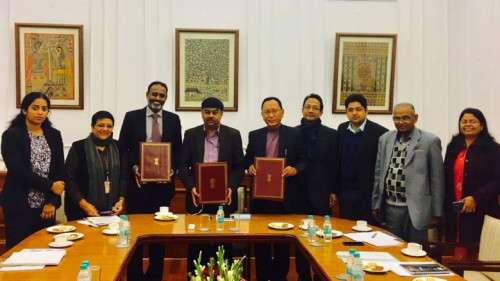Project Signing: Government of India and World Bank Sign $120 million Agreement to Improve Access to Water Supply in Uttarakhand
The Government of India, the Government of Uttarakhand and the World Bank Board on January 22th, signed a $120 million loan agreement which will help increase access to improved water supply services in peri-urban areas in the state of Uttarakhand.

The Uttarakhand Water Supply Program for Peri-Urban Areas will help the state increase water supply coverage as well as ensure sustainable water supply service delivery in peri-urban areas. It will develop and implement a service-oriented and efficient water supply policy for peri-urban areas, strengthen the current monitoring and evaluation systems, and provide dedicated incentives for preparation and adoption of water supply ‘master-plans’ in peri-urban areas.
Growth and urbanization has led to the rise of significant “peri-urban” areas (mostly in the plains) that, while classified as rural, are effectively urban in nature (in terms of density of population, the structure of the economy, and aspirations of the people). The “disconnect” between the formal classification of these populated areas and their actual nature, including provision of water supply, along with unique governance, infrastructure, and service delivery challenges.
From 2001 to 2011, the state’s urban population grew by nearly 42 percent, which is substantially higher than the national average of 32 percent. While the state has made significant strides in piloting and implementing innovative approaches in water supply and sanitation services, water supply services in peri-urban areas have not been a focus.
Over 700,000 people residing in peri-urban areas of the state are expected to benefit from the program
“With increasing urbanization, the demarcation between rural and urban is slowly diminishing. The rise of peri urban areas in Uttarakhand presents many challenges to development,” said Sameer Kumar Khare, Joint Secretary, Department of Economic Affairs, Ministry of Finance, Government of India. “Through this project, the peri-urban population in the state, especially women will have easy access to regular water supply services, thus freeing- up their time for other more socially and economically productive activities.”
The agreement for the project was signed by Sameer Kumar Khare, Joint Secretary, Department of Economic Affairs, Ministry of Finance, on behalf of the Government of India; Arvind Singh Hyanki, Secretary, Department of Drinking Water and Sanitation, on behalf of the Government of Uttarakhand; and Hisham Abdo, Acting Country Director, World Bank, India on behalf of the World Bank.
“About 45 percent of households in peri-urban areas in Uttarakhand are connected with piped water but receive only one to two hours of supply each day, said Hisham Abdo, Acting Country Director, and Operations Manager, World Bank, India. “To meet the needs of the people living in close proximity to growing cities, this program will enable Uttarakhand government provide water supply services in peri-urban areas that are at par with the urban areas of the state.”
The program will focus on increasing coverage, quality and reliability of water supply services in all peri-urban areas of the state. Services would be provided through piped network and metered service connections with a focus on improving the operation and management (O&M) of it. Some of the efforts at improving services under the program will include ensuring a minimum 16-hour water supply which meets Government of India water quality standards, supplied at a minimum pressure of 12m, for no less than 300 days in a year; 100 percent customer metering and volumetric tariffs; and sustainable water supply systems which recover O&M costs through user charges with transparent subsidies, if any.
“With rapid economic growth and urbanization, there is a strong demand for better public services, including water supply in peri-urban areas. This program is now a priority for the state as it moves towards achieving its goal of universal water supply coverage in urban areas by 2030 and in rural areas by 2022. We hope this program shows the way for others addressing service delivery issues in challenging `peri-urban’ areas that are increasingly part of the landscape of India and other countries in South Asia.” said Smita Misra, Lead Water Supply and Sanitation Specialist and World Bank’s Task Team Leader for the program.
The $120 million loan from the International Bank for Reconstruction and Development (IBRD), has a 5-year grace period, and a maturity of 17 years.
Source: World Bank
- 249 reads
Human Rights
Ringing FOWPAL’s Peace Bell for the World:Nobel Peace Prize Laureates’ Visions and Actions

Protecting the World’s Cultural Diversity for a Sustainable Future

The Peace Bell Resonates at the 27th Eurasian Economic Summit

Declaration of World Day of the Power of Hope Endorsed by People in 158 Nations

Puppet Show I International Friendship Day 2020

